The Shanghai Cooperation Organization (SCO) is a major political, economic, and security alliance established in 2001 by China, Russia, Kazakhstan, Kyrgyzstan, Tajikistan, and Uzbekistan. Today, the SCO comprises nine member states, three observer states, and fourteen dialogue partners. The organization focuses on cooperation among member states in various areas, including regional security, economic development, and cultural exchange.
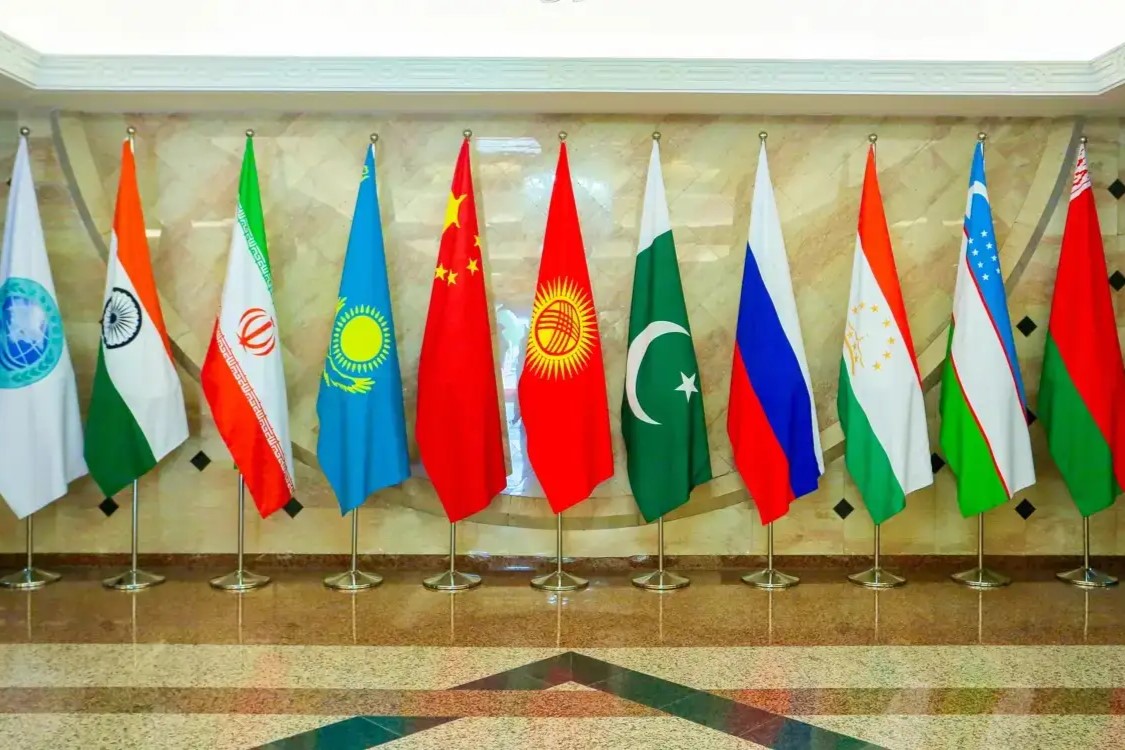
The Shanghai Cooperation Organization (SCO) Summit to be held in Astana on July 3-4. Source: Kaz Inform
This year, under Kazakhstan's presidency, the SCO Summit will be held on July 3-4, 2024, in Astana. With "Strengthening Multilateral Dialogue - Striving for Sustainable Peace and Development" as its official theme, the summit will bring together leaders from SCO member states to discuss a wide range of issues in the political, economic, cultural, and humanitarian fields. Leaders from observer states and dialogue partner countries are also expected to attend. Indian Prime Minister Narendra Modi is expected to be absent, with Foreign Minister S. Jaishankar representing India (India today). A signing ceremony is expected for a package of high-level documents, including the "SCO Development Strategy 2035" and the "SCO Initiative on Promoting World Solidarity, Justice, Peace, and Harmony" (Beijing Daily). Following the summit, the rotating chairmanship will be taken over by China (Tengri News).
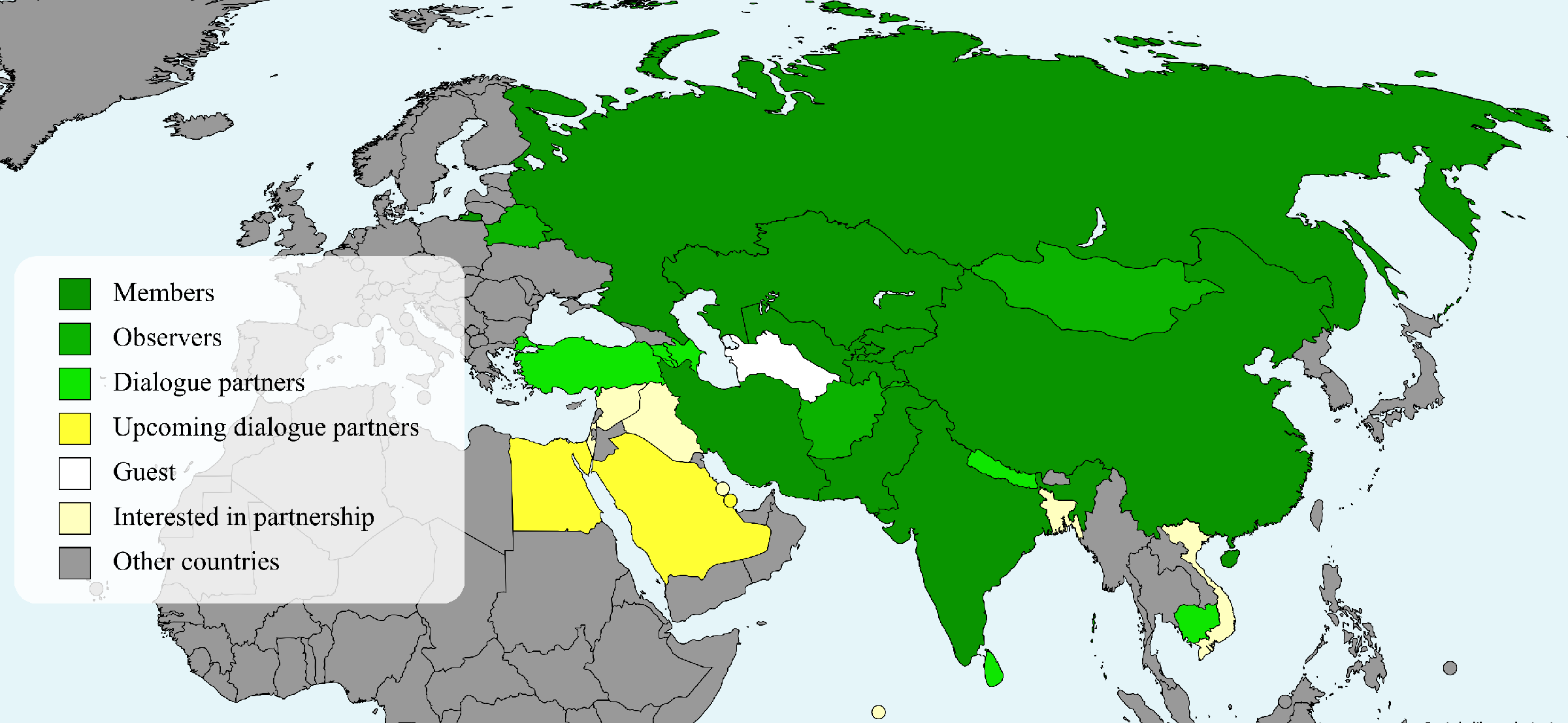
Map of the SCO member-states. Source: Wikimedia Commons
Expansion and New Member-states
A key development at this summit is the admission of Belarus as a new member state. Earlier this year, SCO Deputy Secretary-General Yerzhan Yermekbayev visited Belarus and confirmed that Belarus had fully complied with all necessary procedures and joined all active international treaties within the SCO. "Belarus has long been an observer state and has actively participated in various initiatives. This is why all SCO member states unanimously support Belarus's wish to become a full member," he explained (Xinhua). Belarus became a dialogue partner of the SCO in 2010, attained observer status at the 2015 Ufa Summit, and submitted its application to join the SCO in July 2022. In September 2022, the 22nd Meeting of the SCO Heads of State Council signed a document initiating the process of admitting Belarus into the organization. On February 9, 2023, President Lukashenko approved the draft memorandum on Belarus's obligations for SCO membership. Following last year's summit agreements, Belarus will officially join the SCO at the Astana Summit, becoming its 10th member.
Iran, the last country admitted to the SCO, recently experienced a tragic incident where both the president and foreign minister perished in a helicopter crash. A moment of silence was observed for Iranian President Ebrahim Raisi and Foreign Minister Hossein Amir-Abdollahian, along with other officials lost in the accident, at an earlier meeting between the SCO foreign ministers (Kaz Inform). Despite this, Iran is expected to participate in the meeting as scheduled.
The status of Afghanistan may also be a topic of discussion at the summit. Earlier in June, Russia's special envoy for Afghanistan Zamir Kabulov stated in a briefing that "if the Taliban’s government, currently outlawed in Russia, is recognized by Moscow, Russia will support Afghanistan's accession to the SCO" (Daryo). However, the idea is still in its preliminary stages, and it will be up to member states to decide whether to move forward with it.
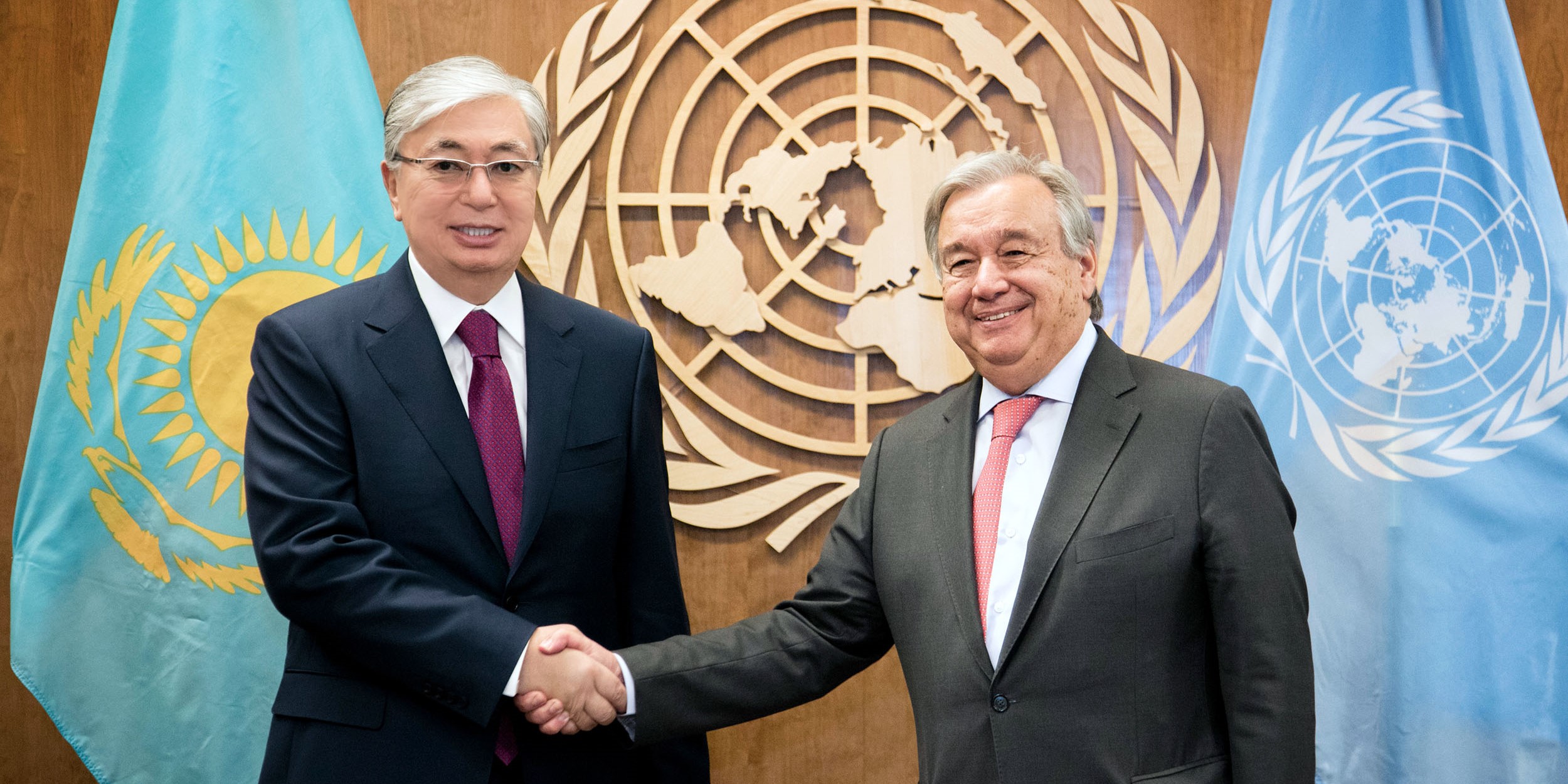
Antonio Guterres to attend the SCO Summit and deliver remarks at the SCO Plus session on July 4. Source: Akorda
Cooperation with other Intergovernmental Organizations
This year’s summit aims to advance multilateral cooperative relations. So far, most cooperation projects between SCO members have been on a bilateral basis (21 Jingji). In recent years, however, there has been a push for increased multilateral cooperation, with the goal of establishing the SCO as a platform for large-scale projects. The summit will also invite the UN Secretary-General and the heads of international organizations such as the Commonwealth of Independent States (CIS), the Organization for Economic Cooperation and Development (OECD), the Conference on Interaction and Confidence Building Measures in Asia (CICA), the Collective Security Treaty Organization (CSTO), the European Economic Community (EEC), and the Islamic Organization for Food Security (IOFS) (Astana Times), which reflects the SCO’s effort to promote multilateralism not only among member states but also among international organizations covering different regions and issue areas around the globe. In the face of major conflicts in Ukraine and the Middle East, the SCO is upping the ante and actively trying to participate in global governance by expanding the organization’s functions and reach. This could be interpreted as the bloc’s deepening concerns regarding peace and security and the imminent need for global dialogue, which also aligns with the UN Secretary-General's assertion that regional organizations play a key role in responding to global challenges given the constraints faced by the UN (Daryo).
One of the key points of cooperation between the international organizations participating in this meeting—such as the CIS, CICA, and CSTO—and the SCO is expected to be in the field of counter-terrorism, which can contribute to the future architecture of security cooperation in the Eurasian region. At the same time, Kazakhstan, which is also in a rotating leadership position in CICA, CSTO, and IOFS (Islamic Organization for Food Security) this year, is likely to pitch for deepening ties between the SCO and these organizations, particularly in the field of food security.
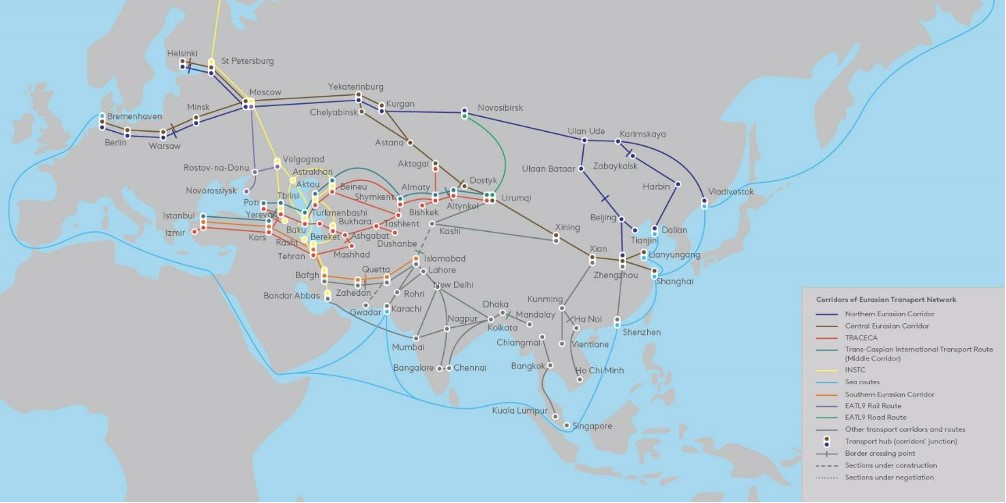
Map of Eurasian Transport Network, developed by EDB.
Trade Integration, Digital Transformation, and Energy Policy
Guli Nurlan Shaimergenova, Director of the Kazakhstan China Research Center, stated in an interview that "Kazakhstan’s presidency of the SCO coincides with a new development phase for the organization. Through joint efforts, we can set the SCO on a new path, injecting fresh vitality into its future. The decisions made at the Astana Summit are expected to promote Eurasian integration and enable the SCO to achieve significant advancements" (21 Jingji). As such, this year’s summit is also anticipated to address key issues in economic cooperation, trade integration, and digital transformation.
Member states are considering proposals for a unified transportation network map and a financial system. Uzbekistan may push forward strategic projects for North-South and East-West corridors, potentially connecting South Asia and the Middle East via Afghanistan and Pakistani ports (Daryo). Uzbekistan’s President Shavkat Mirziyoyev has suggested creating a dialogue platform for e-commerce, e-customs, e-logistics, and digital transport corridors. Concurrently, Kyrgyzstan's President Sadyr Japarov has emphasized the need to establish an SCO Development Bank and a Development Fund, as well as to transition to settlements in national currencies (Daryo). Despite being younger than the SCO, BRICS has made significant economic progress thanks to the New Development Bank. Former Secretary-General of the SCO Vladimir Norov believes that similar to the BRICS, the SCO also needs its own bank or fund (21 Jingji).
On the digital front, Kazakhstan is actively promoting the idea of establishing a shared Digital Forum, focusing on the digital economy, e-commerce, electronic customs, logistics, and digital transport corridors (Daryo). It is reported that the SCO digital forum will take place in Astana later this year. As for energy, SCO member states agreed on the "SCO Energy Cooperation Development Strategy until 2030" at the recent meeting of the Energy Ministers (CCASC). Participants are expected to discuss further cooperation in advancing shared energy initiatives.
Last but not least, the SCO is expected to continue to act as a platform for promoting the Belt and Road Initiative. Despite India's past reservations, China regards this year as the beginning of the second "Golden Decade" for the initiative (Xinhua) and as such, advancing cooperation within the framework of the Belt and Road Initiative is expected to be one of the focal points at the summit.
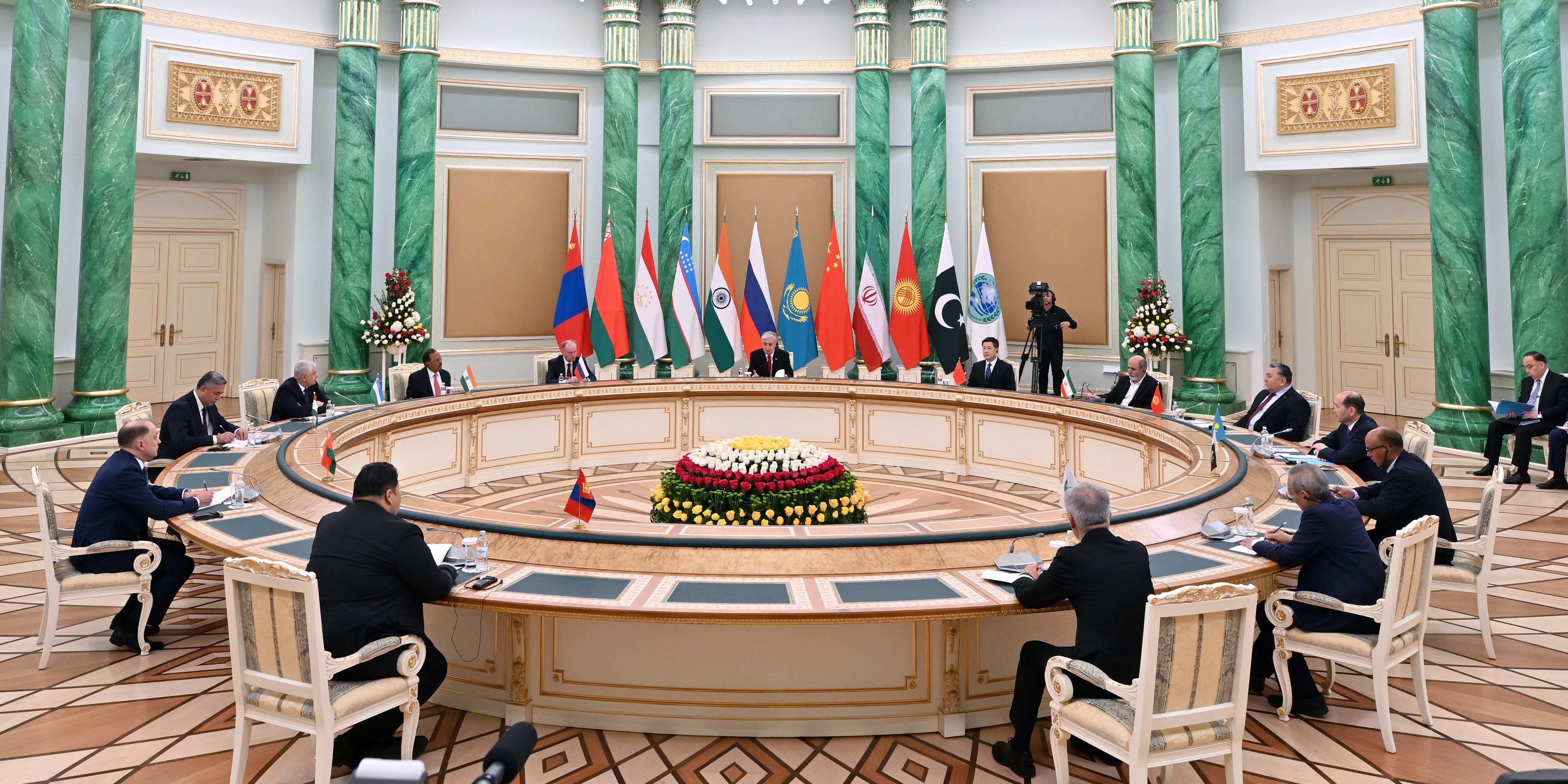
Meeting of the secretaries of security councils of the SCO member-states, April 2024. Source: Akorda
Afghanistan and Regional Security
The situation in Afghanistan will continue to be a significant topic of discussion at the summit, with a focus on anti-terrorism and poverty alleviation efforts. Russian President's Special Representative for SCO Affairs, Bakhtiyer Hakimov, noted in a recent interview that the "Astana Declaration" will articulate the collective stance on key issues related to the SCO's development and various international and regional hotspots (Sputnik China). Since the establishment of the SCO-Afghanistan Liaison Group in 2005, Afghanistan has been a priority for the SCO.
The "Samarkand Declaration" from last year’s summit highlighted the importance of Afghanistan's swift stabilization for regional security and stability. It emphasized support for efforts to eliminate terrorism, war, and drug trafficking, as well as assisting refugees in returning home with dignity, safety, and sustainability. The declaration also stressed the need for an inclusive government in Afghanistan, representing all ethnic, religious, and political groups. The 2023 New Delhi Summit reinforced these priorities by adopting a statement on combating radicalism, terrorism, separatism, and extremism, and the President of Kazakhstan has already underscored the importance of paying close attention to the situation in Afghanistan during the upcoming 2024 SCO Summit (Tengri News). Additionally, the summit may explore new areas of security cooperation, such as cyber and biosecurity, as proposed by Turkey.
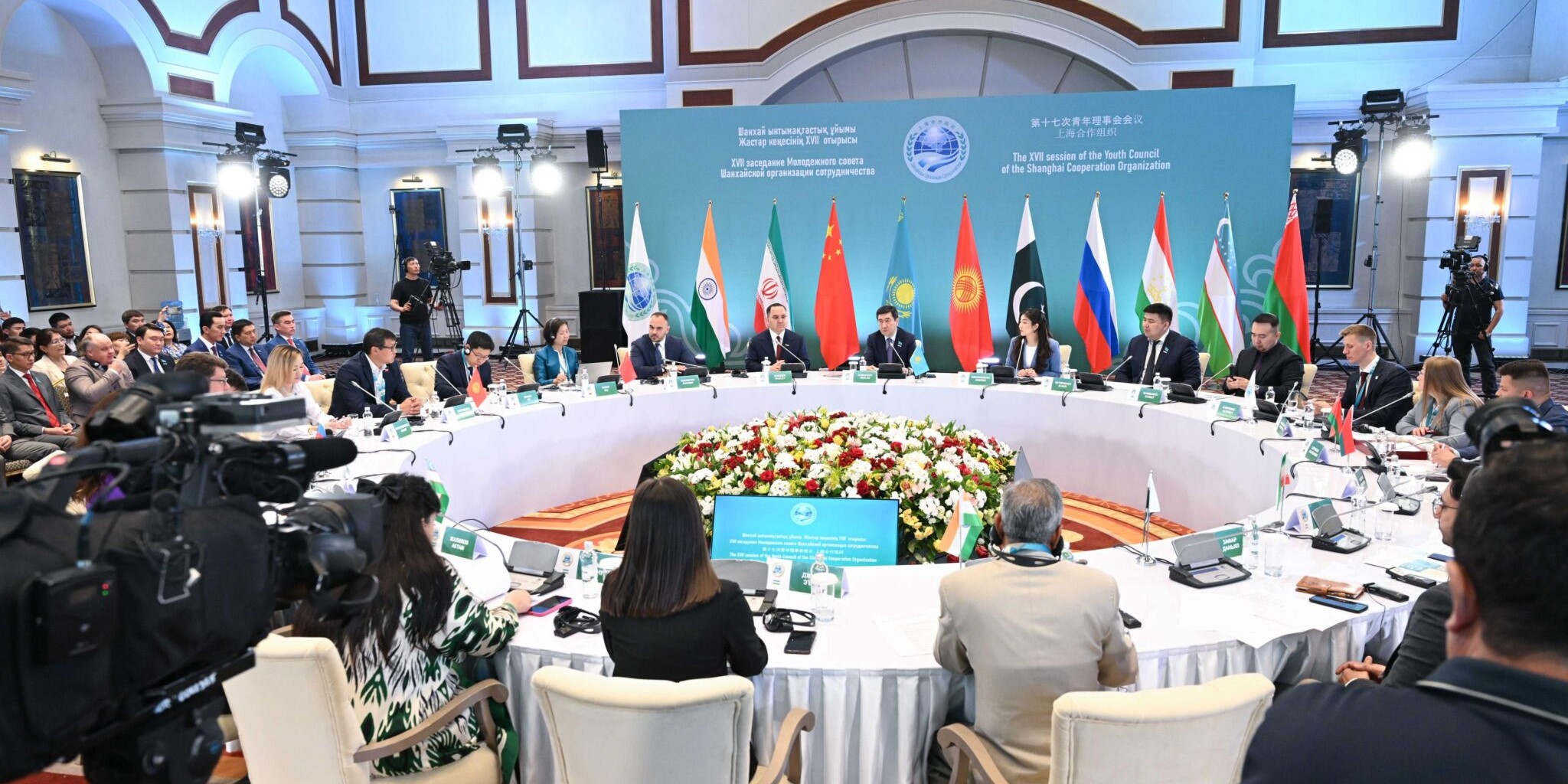
Young leaders from the SCO Youth Council convened in Astana on June 20 to address youth leadership in tackling climate change effects. Source: Astana Times
Climate Action
As part of its SCO chairmanship, Kazakhstan declared 2024 the Year of Ecology (Astana Times). Given the wide-ranging adverse climate events affecting the region, climate security is likely to be a primary topic at the summit. Turkmenistan has proposed establishing a regional center for climate change technologies, a suggestion that might gain traction (Daryo). At the Samarkand Summit last year, the SCO urged developed countries to make greater contributions to the climate fund after 2025. This fund would provide necessary support for developing countries in areas such as funding, technology development, and transfer, helping them combat climate change while achieving sustainable development. These discussions are expected to continue this year, with plans for 2025 and beyond likely to be a key focus.

